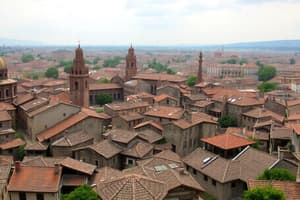Podcast
Questions and Answers
What role does trade play in societal development?
What role does trade play in societal development?
- It connects different cultures and facilitates the exchange of ideas. (correct)
- It solely enhances population governance.
- It has no significant impact on social cohesion.
- It restricts economic growth by limiting resource distribution.
Which of the following best describes social control?
Which of the following best describes social control?
- Mechanisms ensuring conformity to societal expectations. (correct)
- The absence of laws and norms in a society.
- A process that promotes individual agency in decision-making.
- The ability of individuals to resist societal norms.
How does demographic change affect societies?
How does demographic change affect societies?
- It has little to no impact on social conditions.
- It only affects economic conditions without altering social structures.
- Population growth and migration can lead to societal transformation. (correct)
- It creates uniformity in societal behaviors and norms.
What is the focus of comparative analysis in studying civilizations?
What is the focus of comparative analysis in studying civilizations?
Which of the following methods is primarily concerned with understanding cultural diversity in contemporary societies?
Which of the following methods is primarily concerned with understanding cultural diversity in contemporary societies?
What is a defining characteristic of a civilization?
What is a defining characteristic of a civilization?
Which factor is least likely to drive the rise of civilizations?
Which factor is least likely to drive the rise of civilizations?
What aspect significantly influences the evolution of civilizations?
What aspect significantly influences the evolution of civilizations?
Which of the following is a common outcome during the decline of a civilization?
Which of the following is a common outcome during the decline of a civilization?
What role does technology play in the development of civilizations?
What role does technology play in the development of civilizations?
Which of the following features is NOT typically associated with civilizations?
Which of the following features is NOT typically associated with civilizations?
Which of the following describes the process of socialization in the context of civilization?
Which of the following describes the process of socialization in the context of civilization?
How do environmental factors impact the development of civilizations?
How do environmental factors impact the development of civilizations?
Flashcards
Agency
Agency
The ability of individuals to make choices and affect their own lives and society.
Social Control
Social Control
Mechanisms that influence how individuals behave to maintain societal standards.
Social Change
Social Change
The changes in how societies are structured and function over time.
Historical Analysis
Historical Analysis
Signup and view all the flashcards
Comparative Analysis
Comparative Analysis
Signup and view all the flashcards
What is a society?
What is a society?
Signup and view all the flashcards
What is culture?
What is culture?
Signup and view all the flashcards
What is a civilization?
What is a civilization?
Signup and view all the flashcards
What is socialization?
What is socialization?
Signup and view all the flashcards
What are social institutions?
What are social institutions?
Signup and view all the flashcards
How does environment impact societies?
How does environment impact societies?
Signup and view all the flashcards
How does technology impact societies?
How does technology impact societies?
Signup and view all the flashcards
How do political systems impact societies?
How do political systems impact societies?
Signup and view all the flashcards
Study Notes
Introduction to Individuals and Societies, Civilizations
- Understanding human societies and their development across time.
- Examining the interplay between individuals and larger societal structures, including civilizations.
- Analyzing how civilizations arise, evolve, and decline, along with the factors influencing these processes.
Key Concepts in Understanding Individuals and Societies
- Individual: A single human being, possessing unique characteristics, experiences, and agency.
- Society: A group of individuals who share common culture, values, and institutions, forming a collective.
- Culture: Shared beliefs, values, customs, behaviors, and artifacts of a group or society.
- Social Structures: Established patterns of relationships and institutions shaping individual behavior and societal dynamics.
- Socialization: The process by which individuals learn and internalize societal norms and values.
- Social Institutions: Established sets of rules and customs organizing social life (e.g., family, education, religion, government).
Civilizations: Defining Characteristics and Development
- Civilization: A complex society with advanced social, political, economic, and cultural characteristics.
- Key features often include:
- Urban centers
- Specialized labor
- Complex social hierarchies
- Advanced technology
- Monumental architecture
- Writing systems
- Rise of Civilizations: Factors driving civilization development often include favorable geography, agricultural surplus, technological innovations, and political organization.
- Evolution of Civilizations: Civilizations experience growth, prosperity, decline, and transformation or collapse, driven by complex and multifaceted factors.
- Interaction Between Civilizations: Exchange of ideas, goods, and technologies between civilizations shapes their development.
Factors Influencing Societal Development
- Environment: Physical geography, climate, and resources impact societal practices, settlement patterns, and economic activities.
- Technology: Innovations in tools and techniques influence societal organization, productivity, and overall trajectory.
- Political Systems: Governance structures shape social hierarchies, resource allocation, and societal stability.
- Economic Systems: Methods of production, distribution, and consumption shape social relationships and inequalities.
- Religion and Belief Systems: Shared values, rituals, and beliefs influence societal behavior and social cohesion.
- Trade: Facilitates the exchange of goods and ideas, shaping societal interaction and economic development.
- Conflict and Warfare: Periods of conflict disrupt social order, redistribute resources, leading to societal transformation or decline.
- Demographic Factors: Population growth, migration patterns, and disease outbreaks influence social and economic conditions.
The Interplay of Individuals and Societies
- Agency: Individuals have the capacity to act independently and make choices affecting their lives and society. Agency is not equally distributed.
- Social Control: Societal mechanisms (e.g., norms, laws, social pressure) influence individual behavior ensuring conformity to societal expectations.
- Social Change: Evolution of societal structures reflects the interplay between individual agency and social pressures.
Studying Civilizations and Societies
- Historical Analysis: Studying past civilizations and societies using primary and secondary sources.
- Comparative Analysis: Comparing different civilizations and societies across time and space to identify patterns and distinctions.
- Archaeological Evidence: Understanding past civilizations and societies through physical remains.
- Anthropological Studies: Examining contemporary societies to gain insights into human adaptation and cultural diversity.
Studying That Suits You
Use AI to generate personalized quizzes and flashcards to suit your learning preferences.
Description
Explore the fundamental concepts related to individuals and societies, including the development of civilizations over time. This quiz examines the relationships between individuals and societal structures, focusing on culture, socialization, and social institutions.




